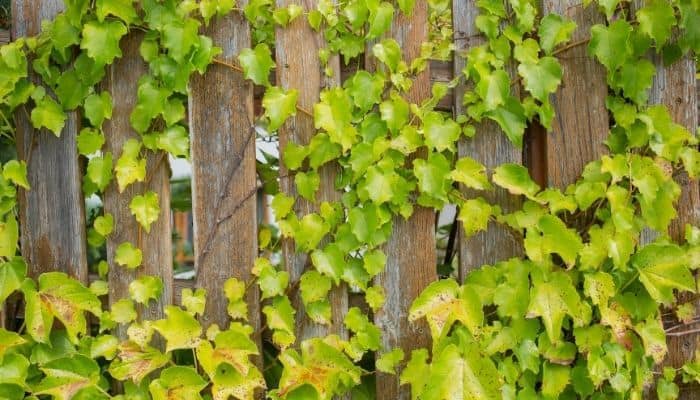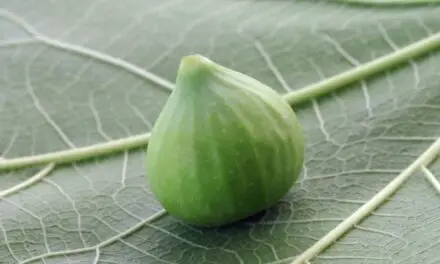Vines can be a stunning addition to any home.
They creep up structures, allowing you to have a beautiful yet natural decoration in your yard.
This makes ivy an ideal choice for many homeowners.
But if it’s creeping up your wooden fence, you probably need to put a stop to it.
Table of Contents
Will Ivy Damage My Fence?

Ivy will damage your fence it is wooden. Unfortunately, many popular ivy types, such as hydrangea and English are beautiful but bring rot and fungus, leading to structural damage to your wood fence.
eventually, ivy will even cause pressure-treated wood to rot.
However, there are other fence-friendly vines that are stunning to look at and do not cause damage.
In this article, we are going to talk about fence damage caused by vines, how to fix the damage, and how to prevent it in the first place.
How Does Ivy Damage Fences?
Ivy retains moisture and that creates a breeding ground for mold and rot on wooden fences.
Ivy also works its way into cracks in the wood grain and in between boards.
This can widen cracks, pry open joints and damage your fence’s structure.
Ivy can also harbor insects and pests that like to eat away at wooden structures.
If you select a woody vine, it can easily cause damage to a wooden fence.
Woody vines tend to bring rot and insects, both of which can damage the fence permanently.
At the same time, ivy will not damage vinyl fences or metal fences.
Similarly, annual vines tend to be a great choice for all fence types, including wooden fences.
The most damaging form of ivy is woody vines.
These vines can cause structural damage to wooden fences and they bring rot, fungus, and bugs.
All three eat away at the fence and significantly lower its lifespan.
Related Article: Will Soil Rot My Fence? (And How To Slow It)
Should I Remove Ivy From My Fence?
You should remove woody ivy if it is located on a wooden fence.
Although the ivy will keep coming back, just pulling it off your fence is one of the most effective ways to deal with it.
Wooden fences are the most susceptible to damage caused by ivy.
If you like to have vines growing on your fence, should remove the woody ivy and replace it with a nonwoody option, such as an annual vine.
At the same time, you do not necessarily need to remove the ivy if your fence is made from vinyl.
Vinyl will not rot, but it can be ridden with algae and insects if you do not clean it frequently.
For metal fences, any type of vine will do, and you don’t have to remove any type of ivy from it.
How Do You Fix Ivy Damage On Your Fence?
If you already have ivy damage on your fence, you’ll need to assess the damage first.
Begin by looking at the type of fence you have.
If the fence is vinyl, you probably only need to clean it off.
You can use a gentle hose or a cloth.
Metal fences should not have any damage or need any repairs.
Wooden fences are the only ones that can really be damaged by ivy.
Assess the amount of damage to decide where to go next.
If the fence only has a little bit of mold, then it’s probably not worth replacing a whole section of your fence.
But it’s important to remove the ivy so that the situation doesn’t worsen.
If rot and mold have really set in, you may need to completely replace a part of or even the entire fence if the whole structure has become weakened.
How Do You Prevent Ivy From Damaging Your Fence?
The best way to prevent ivy damage on a fence is to select the right ivy type based on your fence.
If your fence is wooden, only select annual, herbaceous vines.
These stems will wrap around the fence, but they won’t cause structural damage.
Sweet pea, moonflower, and morning glory are great options but remember you must remove them after the growing season is done.
As for vinyl fences, you have a lot more options to choose from since structural damage is much less likely.
Coral honeysuckle is a great option because it climbs well, and you can clean through them.
As for metal fences, you can select any vine you would like, including woody options.
Roses, hydrangeas, and grapevines all work great with metal.
If ivy is creeping onto your fence from your neighbor’s property, it’s best to talk to them about getting rid of the ivy altogether because it will just keep coming back.
If you cannot deal with your neighbor, you’ll just have to remove the ivy as soon as you see it appear on your fence or on your side of the fence.
The best way to stop it from doing damage is to not let it remain there for any length of time.
How To Get Rid Of Ivy For Good
If ivy is creeping along the ground and up your fence or otherwise out of control in your garden, you’ll want to use a store-bought brush killer that’s effective against ivy – or you could just make your own formula.
To make your own ivy killer, just mix together white vinegar and dish soap and add it to a garden sprayer.
Use a mixture of about 80% soapy water (or plain water) and 20% white vinegar.
But before you spray it on the ivy, you’ll need to cut into the vines.
You’ll have to gently cut away any vines that are growing up trees, being careful not to pull off the bark.
Use a weed eater to go around and slice up all of the ivy on the ground then you can spray your mixture all over it – just be careful not to spray your flowers or any plants you want to keep.
Leave the area for a couple of weeks so the ivy loosens its grip on the ground.
After a couple of weeks, the vine’s roots should be loose enough to simply rake up out of the ground.
This should permanently get rid of the ivy.
Use Artificial Ivy Panels For Your Fence
If you like the look of bushy vines on your wooden fence but you don’t want to have to deal with the mold, rot, and bug issues, then a fake ivy fence might be worth considering.
You can buy square or rectangle artificial ivy panels to install directly onto your wooden fence.
These fake ivy panels come with fixtures so they can easily be screwed into the wood.
The ivy looks lush, bushy, and extremely life-like.
You would have to get right up close and touch it to realize that it was artificial.
Use 3 or 4-inch metal, sharp point screws to attach the ivy panels to your fence.
These screws are easy to drill in and remove, they are unlikely to split the wooden panels on your fence and they won’t rust.
Final Thoughts
Ivy will damage your fence if you select the wrong type for your fence’s material.
The best way to prevent ivy damage is to select an ivy based on the fence you already have.
This is especially true if your fence is made from wood.
Wood is most likely to rot, meaning you must be more selective about the vine type.
Select non-woody vines if you have a wooden fence.
If you have a vinyl or metal fence, however, the ivy will not cause damage.
You might have to clean the fence, but the ivy won’t cause any structural issues.
Select any ivy you like if your fence is made from vinyl or metal.




